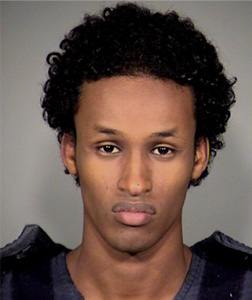 The FBI used undercover agents posing as Islamic militants to ensnare a Somali-American teenager who'd been identified as a potential al0Qaida recruit. The agents helped Mohamed Osman Mohamud plan the car-bombing of a Christmas tree lighting ceremony in Portland, Ore., before arresting him on Friday. How does the FBI train undercover agents to act like Islamic militants?
The FBI used undercover agents posing as Islamic militants to ensnare a Somali-American teenager who'd been identified as a potential al0Qaida recruit. The agents helped Mohamed Osman Mohamud plan the car-bombing of a Christmas tree lighting ceremony in Portland, Ore., before arresting him on Friday. How does the FBI train undercover agents to act like Islamic militants?With a few catchphrases. There is no organized jihadi network in the United States—most aspiring terrorists discussed in the media, like Mohamud, have been young, inexperienced, solitary actors. Prolonged infiltration of a criminal enterprise under deep cover therefore isn't required, and agents only need to be convincing enough to hoodwink one or two novice criminals. Moreover, since jihadis come from many parts of the world and speak different languages, the undercover agent doesn't necessarily have to speak fluent Arabic without an accent. The bureau does prefer agents who could pass as South Asian, East African, or Middle Eastern, but if they can't, that's not a deal-breaker. Training boils down to educating undercover agents in a certain brand of radical Islamic theology, and teaching them expressions—like the traditional Arabic greeting As-Salamu Alaykum.
The FBI does have a long history of infiltrating the Sicilian Mafia with inventive recruitment and training techniques. If an Islamic terrorist network were to establish itself in the United States, the bureau would likely employ some of the lessons they've learned from taking down the mob.
important as you might think when selecting an operative. Internal FBI memoranda concerning recruitment for undercover agents don't typically mention physical appearance, and the agency has made some surprising choices. Joaquin "Jack" Garcia, an American of Cuban extraction, became one of the agency's more successful undercover agents by infiltrating the Sicilian Mafia—an organization with far more cultural uniformity than domestic Islamic terrorists. Garcia so thoroughly convinced La Cosa Nostra of his authenticity that they offered to make him an official wiseguy.
If the agent is going to be working in the field over an extended period, the agency creates a complete identity for him. Garcia played Jack Falcone, a fourth-generation Italian-American with roots in Sicily. Before appearing on the mob's doorstep, the fictional Falcone had worked as a jewel thief and extortionist. Agent Robert Mazur brought down several drug kingpins by establishing an undercover identity as an international money laundering specialist. The FBI chose his name, Bob Musella, from a baby who died in New Jersey a few years after Mazur was born. Then it opened bank accounts in Musella's name, gave him a career background, and set up references who could vouch for him.
If cultural education is a requirement, the Bureau can provide that as well. The FBI assigned a genuine Italian-American staffer to put Garcia (aka Jack Falcone) through "mob school." He learned what it would have been like to grow up in an Italian household, was outfitted with Armani suits, wore garish jewelry, and spent hours watching Italian cooking shows on the Food Network so he could offer his targets a few shavings of ParmigianoReggiano without tipping them off.
Got a question about today's news? Ask the Explainer.
Explainer thanks terrorism analyst J.M. Berger, Peter Earnest of the International Spy Museum, and Marc Sageman, author of Leaderless Jihad: Terror Networks in the Twenty-First Century. slate



.jpg)












No comments:
Post a Comment